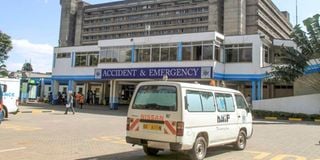Premium
Empty wards at KNH as patients bear the brunt of doctors' strike

Kenyatta National Hospital in Nairobi.
What you need to know:
- The hospital usually receives hundreds of patients a day.
- Nurses hold forte, as laboratory technologists threaten to strike.
The country’s national referral facility, Kenyatta National Hospital, is bearing the brunt of the doctor’s strike.
The hospital usually receives hundreds of patients a day. But now most of the wards are empty.
The wards that usually receive an influx of patients, such as the labour and oncology wards, are presently 10 patients each.
A spot check by the Nation found some of the wards completely empty.
At the beginning of the strike, the hospital had received an influx of patients.
At the time, the Kenya Medical Practitioners Pharmacists and Dentists Union (KMPDU) had allowed their members to offer bare minimum and emergency services.
Now, nurses hold forte, even as laboratory technologists prepare to commence their strike on Friday.
Those with patients at the hospital expressed their frustration with the lack of services at the facility.
Some of them said they have opted to transfer their kin to the hospital’s private wing, where they have to incur higher bills.
In worst-case scenarios, some relatives have been forced to return home with their ailing kin.
With the doctor’s strike entering the 23rd day, it would appear that the majority of Kenyans may have been forced to seek the services of private hospitals.
However, the situation is likely to change for the worse after KMPDU announced that consultants, who offer services in both public and private hospitals, have also downed their tools.
Speaking when he made the announcement, KMPDU Secretary-General Davji Atellah said consultants can only work when there are referrals, which are currently unavailable.
“If consultants go to the hospital, and no doctors are available, nothing will happen. They have said they will not be in the hospitals or universities, even if there is no work. They will not be in their private facilities to offer services," said Dr Atellah.
"We are in the process of escalation of the strike. Clinical training at the University of Nairobi is suspended, and the same will be done tomorrow (Friday) at the Moi Teaching and Referral Hospital. The strike will continue until the government realises that it is their responsibility to cater for healthcare,” he said.
Early this week, the National Treasury released Sh2.4 billion to facilitate the posting of medical interns, following the guidelines provided by the Salaries and Remuneration Commission (SRC).
Subsequently, the Head of Public Service Felix Koskei directed medical interns to pick their posting letters from the Ministry of Helath by April 4.
However, on Thursday, Dr Davji advised the medical interns against picking the letters.
Dr Atellah said the Sh45,000 to Sh70,000 monthly gross pay that the government wants to give the intern doctors is much less than the Sh150,000 monthly net pay the union is demanding.
He said the money that the government claimed to have released for doctor interns was meant for all the medical interns.
"They have released letters purporting to post medical interns, but we have asked interns not to pick those letters. They will not pick those letters until the government honours all elements of the CBA," he said.
Consultants at the meeting decried the government’s delayed posting of medical interns, as well as the reduction of their pay, which they termed as unfair.
Prof Elly Nyaim, a consultant, and former president of the Kenya Medical Association said that while the strike has occasioned great suffering, some government officials have made no effort to understand the situation.
“Universal health coverage cannot be achieved without respecting the healthcare workforce. If you visit any public hospital, you will find that interns handle more than 60 per cent of the work. We cannot wish them away," Prof Opot said.
Prof Stanley Ndwiga, a consultant and lecturer, also lamented the mismanagement of the country's health sector.
“We have doctors who have completed their training but haven't been assigned to work yet. In some counties, you can only find a doctor at a Level Four Hospital. This means it takes a longer time for a patient to see a doctor," said Prof Ndwiga.




